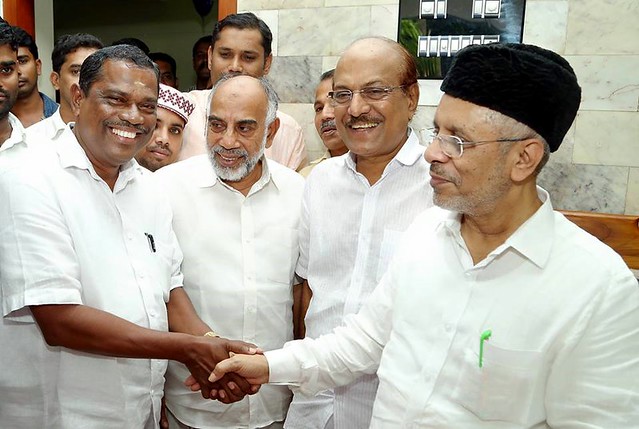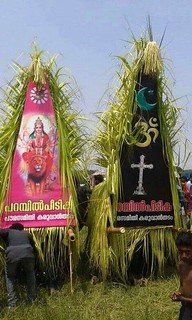By Shafeeq Hudawi, Twocircles.net
What would you call a district where female literacy is more than 90%? Where the sex ratio is much better than the national average, and the number of homeless people in less than 1,000 out of a population of over 40 lakh? A district, which has no history of communal riots, where people from various communities live in peace and which boasts of number of colleges and universities?
If you are Subramanian Swamy, you would ask for AFSPA in the region. Because the district is Malappuram, the only Muslim majority district in the country. Makes sense? No? Yes? Either ways, read on.

Swamy has never been known for his rational arguments, but in response to a small blast in the district, the BJP leader was of the opinion that the situation in the district is deteriorating and hence, it must be handed over to the Army and come under AFSPA.
It is not a coincidence that the response to one small blast was so over the top: remember, we have Swamy on one side and a prosperous, Muslim majority district on the other. Things are unlikely to ever be harmonious between the two.
The district, which has close to 70% Muslims, has always been painted as a hub of anti-national activities by the right-wing, and it is not even a new phenomenon.
Malappuram formation was opposed for creating a ‘mini-Pakistan’
Malappuram district was carved out of Kozhikode and Palakkad districts for easier administration and development in 1969. The saffron fringe as well as Congress extended stiff protest against the decision to form a new district citing Malappuram will turn into a, you guessed it, mini Pakistan. “Led by Madan Lal Khurana at the national level and locally by O Rajagopal, it was the Bharatiya Jan Sangh which extended stiff opposition against the move to form the district. The 14th annual session of the party, held in Kozhikode in 1967, marked strong ire against the move. Even the Communist chief minister EMS Namboodiripad tried to draw back his decision to form the district following he was pressed by the Congress and Sangh leaders,” says TPM Basheer.

“IUML leaders Panakkad Syed Hyderali Shihab Thangal and KPA Majeed congratulating A P Unnikrishnan when he was selected as Malappuram district panchayat president”
Basheer’s recently published book ‘Malappuram District, Birth and Journey’ points out how political leaders tried to nip the demand for the district in the bud.
“Wayanad district and Idukki district were carved out from Kozhikode and Kottayam districts. But, no one complained of these two districts,” he adds.
There is also the history of armed struggles in the region during the British period, which was later presented as a communal issue. During British regime, the Madras Government had set up a special wing of police named Malabar Special Police (MSP) taking note of the resistance, extended by Muslims here against the invaders.
Muslims of Malappuram, better known as Mappilas, were one of the real threat for British in the country. Led by Ulemas, the extended stiff resistance against British and Hindu landlords. “Muslims here turned to be peasants after they lost monopoly as merchants in sea following the invasion of Europeans. The farmers here had to pay huge amount as tax to both British and Hindu landlords,” says Basheer.
Fed up with the injustice, a series of armed campaigns were carried against Hindu landlords.
“These erupted due to no communal motive. But, British rulers gave them communal colour. And Sangh-leaning historians misinterpreted the history and they are still doing it for the sake of Sangh Parivar saying Hindus are mistreated by Muslims in Malappuram,” Basheer adds.
In lines with British, the first Congress government also did injustice to the district by setting up a unit of Rapid Action Force (RAF) here after independence citing Malappuram was one of sensitive areas in the country with vulnerability to communal riots.
“In fact, both RAF and MSP assume no importance in the present scenario of Malappuram. With no riots reported, RAF and MSP are functioning like reserve battalions, which support the state police in emergency matters across the state. But, the authorities are following the footsteps of colonial rulers,” says Malappuram municipal councilor Advocate Abdul Majeed.
But let us come back to AFSPA.
Armed Forces (Special Powers) Act (AFSPA) grants special powers to the Indian Forces in what each act terms “disturbed areas”. If the data, published by the National Crime Records Bureau (NCRB) is an indication, there is no room for even an argument of AFSPA to be imposed in the district. “The district tops while it comes to the population in the state. But, other districts have left it behind in crime rate,” says former Kerala Public Relations Department additional director P A Rasheed.

“The Kaliyattakkavu Bhagavathi Temple in Malappuram. The festival is considered as the symbol of communal harmony in the district”
And this figure is backed by statistics. According to NCRB data, Malappuram is ninth in crime rate with a rate of 433.76 while Eranakulam, Thrissur, Kottayam, Thiruvananthapuram and Kollam recorded rate of 851, 760, 623, 620 and 570. But no one would suggest AFSPA for other regions of Kerala, right? Because, you see, not enough Muslims.
Prosperous district built on remittances
What makes Malappuram stand out in terms of economy is remittances of the expatriates from Gulf countries. The district, that once was known mainly for backward Muslims in terms of money and education, has now developed as an upwardly rich and middle class area inhabited mostly by educated Muslim traders, professionals, government employees and sportsmen too.
Malappuram is ninth among the ten towns with highest per capita bank deposits in India. “Gulf money has brought a boost to the economy of Muslims here and the whole district. Muslims have turned strong trader community and taken over the hotels, bakery, textile and medical sectors, which were once mainly handled by Hindus here. This might have turned a provocation for the Sangh fold,” says Rasheed.
According to Basheer, the educational explosion that the district has been witnessing for the past few years adds to the apprehension of Sangh Parivar. Presently, Malappuram is one of the leading districts in India with the most number of medical students as undergraduates studying at various colleges across the country and abroad. The district has added two medical colleges, Government Medical College, Malappuram and MES Medical College, and two universities, University of Calicut and Thunchath Ezhuthachan Malayalam University to its credit. “In lines with Azamgarh in Uttar Pradesh and Bhatkal in Karnataka, they are taking up efforts to demonise the people here through wide campaigns. They are carrying campaigns of atrocities after taking cue from exodus stories of Khairana,” Basheer added. A few months back, Subramanian Swamy had alleged that the Vishwa Hindu Parishad (VHP) was not allowed to organise its state conference here. “In fact, the vehicles which carried participants from across the state were given parking area at the compound of an educational complex, run by Muslim scholars here. The Hindutva forces are trying an hand with the Fascist theory of establishing a lie as truth by repeating the lies ” Basheer said.
Dalit leader speaks out against Swamy’s lies
If one follows the argument of Swamy, it would seem that no non-Muslim has any chance of living a life of dignity in Malappuram, and that they have no chance of being elected for any office. So, to get the view of the non-Muslims, Twocircles.net spoke to AP Unnikrishnan, who is a Dalit and President, District Panchayat. Unnikrishnan, who has been working with Indian Union Muslim League and its feeder organizations for last 38 years, won the election on the party’s ticket. “I am sure that Malappuram is the safest place in the country for a Hindu to lead his life. Here mosques and temples are standing in one line, where lamps of interfaith harmony are shining,” Unnikrishnan said rubbishing the campaigns of atrocities against certain community.
Unnikrishnan’s two sons are functioning with IUML’s youth and students outfits Youth League and Muslim Students Federation (MSF). The district panchayat goes on to say that dalits are not facing any kind of discrimination from upper castes due to the presence of Muslims.
Malappuram is not perfect, of course: in July this year, Muslim organisations joined hands to ensure that all children, especially Muslims, get their vaccines in time as the district had seen a rise in Diphtheria cases. Though the health department officials refused to name anyone, they said that anti-vaccination campaigns by orthodox Muslim groups lead to the resistance in Muslim strongholds. The district needs to fight against these issues, but not even the most bigoted person would say that this needs the Army’s attention.
But when did Swamy bow down to logic?

